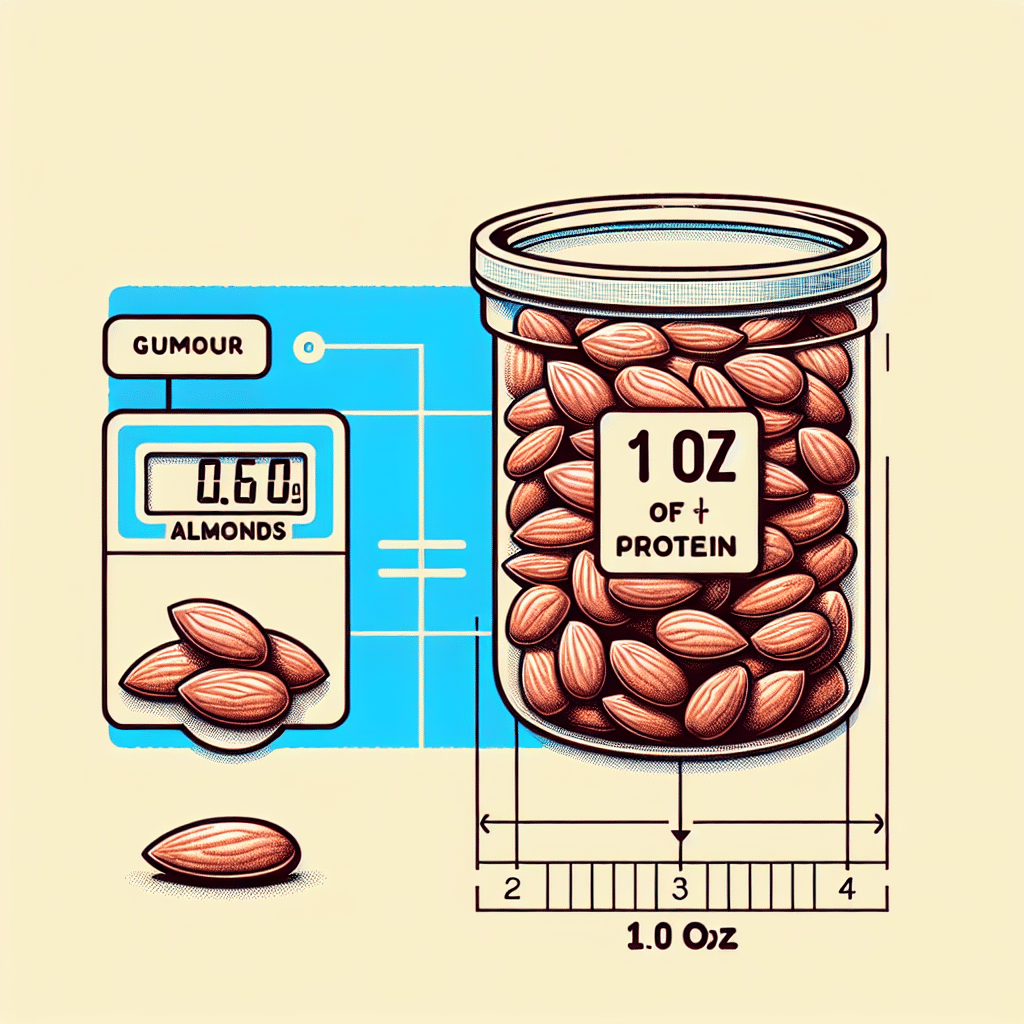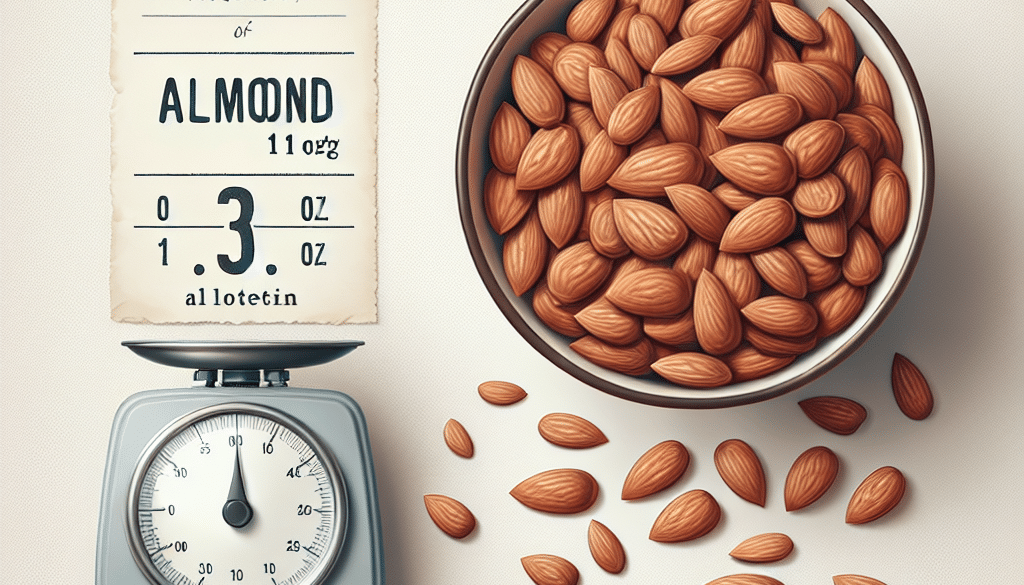How Many Almonds Are Equivalent To 1 Oz Of Protein?
-
Table of Contents
- Almonds and Protein: Understanding the Nutritional Equivalent
- Understanding Protein Requirements
- The Protein Content of Almonds
- Comparing Almonds to Other Protein Sources
- Health Benefits of Almonds
- Incorporating Almonds into Your Diet
- Conclusion: Balancing Almonds and Protein Intake
- Explore ETprotein’s High-Quality Protein Products
Almonds and Protein: Understanding the Nutritional Equivalent

Almonds are a powerhouse of nutrients, offering a blend of healthy fats, fiber, vitamins, and protein. They are a popular snack among health-conscious individuals and are often recommended by nutritionists for their numerous health benefits. One of the most common questions regarding almonds is how many of them equate to 1 oz of protein. This article delves into the nutritional profile of almonds, focusing on their protein content, and provides insights into how they can contribute to your daily protein intake.
Understanding Protein Requirements
Before we can determine the number of almonds equivalent to 1 oz of protein, it’s essential to understand what protein is and why our bodies need it. Protein is a macronutrient that is vital for building muscle mass, repairing tissues, and producing enzymes and hormones. The Recommended Dietary Allowance (RDA) for protein is 0.8 grams per kilogram of body weight per day for the average adult. However, this amount may vary depending on age, sex, physical activity level, and overall health.
The Protein Content of Almonds
Almonds are a good source of plant-based protein. On average, a single almond contains about 0.25 grams of protein. To put this into perspective, an ounce (approximately 28 grams or 23 almonds) contains about 6 grams of protein. Therefore, when considering the protein content alone, you would need to consume roughly 4 to 5 ounces of almonds (or about 92 to 115 almonds) to get the equivalent of 1 oz (28 grams) of pure protein.
Comparing Almonds to Other Protein Sources
It’s important to compare almonds to other protein sources to understand their place in a balanced diet. Animal-based proteins, such as chicken, beef, or fish, typically contain a higher concentration of protein by weight. For example, a 3 oz serving of chicken breast can provide about 26 grams of protein, which is equivalent to the protein content in about 4.3 oz of almonds.
- Chicken breast (3 oz): ~26 grams of protein
- Beef (3 oz): ~22 grams of protein
- Fish (3 oz): ~20 grams of protein
- Almonds (4.3 oz): ~26 grams of protein
However, almonds offer additional nutritional benefits, such as healthy fats, fiber, and micronutrients, which are not as abundant in animal proteins.
Health Benefits of Almonds
Almonds are not only valued for their protein content but also for their overall nutritional profile. They are rich in monounsaturated fats, which are known to be heart-healthy. Almonds also contain significant amounts of vitamin E, magnesium, and potassium, which contribute to various health benefits:
- Heart Health: The healthy fats in almonds can help lower bad cholesterol levels and reduce the risk of heart disease.
- Weight Management: Almonds are satiating, which can help control appetite and support weight management efforts.
- Blood Sugar Control: The low glycemic index of almonds makes them suitable for people with diabetes, helping to manage blood sugar levels.
- Antioxidant Properties: Vitamin E in almonds acts as an antioxidant, protecting cells from oxidative damage.
Incorporating Almonds into Your Diet
Almonds can be incorporated into your diet in various ways to help meet your protein and nutritional needs. Here are some ideas:
- Snacking on raw or roasted almonds
- Adding sliced almonds to salads or yogurt
- Using almond flour in baking
- Spreading almond butter on toast or fruit slices
- Drinking almond milk as a dairy alternative
It’s important to note that while almonds are nutritious, they are also calorie-dense. Moderation is key to enjoying their benefits without consuming excess calories.
Conclusion: Balancing Almonds and Protein Intake
In conclusion, while almonds are a valuable source of protein, they should be part of a diverse diet that includes a variety of protein sources. To achieve the equivalent of 1 oz of pure protein, one would need to consume a significant quantity of almonds, which may not be practical or necessary for most people. Instead, consider almonds as a nutritious snack or ingredient that contributes to your overall protein intake while providing other essential nutrients.
Explore ETprotein’s High-Quality Protein Products
If you’re looking to supplement your diet with additional protein, ETprotein offers a range of organic bulk vegan proteins that can complement your intake. Their products, including rice protein, pea protein, and various seed proteins, are characterized by a neutral taste, non-GMO, and allergen-free attributes. With L-(+)-Ergothioneine purity over 98%, ETprotein caters to a diverse range of industries and dietary preferences.
Whether you’re involved in sports nutrition, weight management, or general health and wellness, ETprotein’s products can provide the protein boost you need. For more information or to sample their products, contact ETprotein and email sales(at)ETprotein.com today.
About ETprotein:
ETprotein, a reputable protein and L-(+)-Ergothioneine (EGT) Chinese factory manufacturer and supplier, is renowned for producing, stocking, exporting, and delivering the highest quality organic bulk vegan proteins and L-(+)-Ergothioneine. They include Organic rice protein, clear rice protein, pea protein, clear pea protein, watermelon seed protein, pumpkin seed protein, sunflower seed protein, mung bean protein, peanut protein, and L-(+)-Ergothioneine EGT Pharmaceutical grade, L-(+)-Ergothioneine EGT food grade, L-(+)-Ergothioneine EGT cosmetic grade, L-(+)-Ergothioneine EGT reference grade and L-(+)-Ergothioneine EGT standard. Their offerings, characterized by a neutral taste, non-GMO, allergen-free attributes, with L-(+)-Ergothioneine purity over 98%, 99%, cater to a diverse range of industries. They serve nutraceutical, pharmaceutical, cosmeceutical, veterinary, as well as food and beverage finished product distributors, traders, and manufacturers across Europe, USA, Canada, Australia, Thailand, Japan, Korea, Brazil, and Chile, among others.
ETprotein specialization includes exporting and delivering tailor-made protein powder and finished nutritional supplements. Their extensive product range covers sectors like Food and Beverage, Sports Nutrition, Weight Management, Dietary Supplements, Health and Wellness Products, and Infant Formula, ensuring comprehensive solutions to meet all your protein needs.
As a trusted company by leading global food and beverage brands and Fortune 500 companies, ETprotein reinforces China’s reputation in the global arena. For more information or to sample their products, please contact them and email sales(at)ETprotein.com today.












